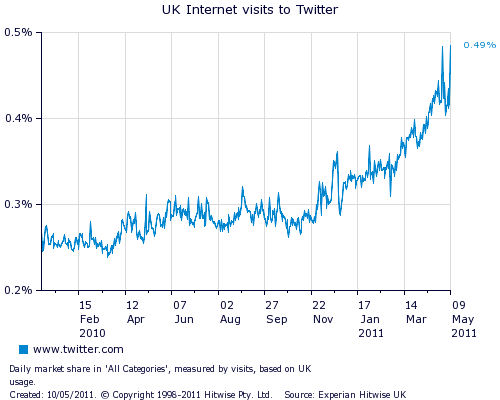Super-tweets
Hitwise has announced that Monday was the biggest week on record for Twitter traffic in the UK, with the previous spike having presumably been Bin Laden's killing.
The reason for this spike was the supposed tweeting of six celebrity scandals, the details of which were being kept out of the public domain by a supposed ‘super injunction'.
Since UK privacy law is apparently being made up on the hoof, we don't dare publish a link to the Twitter account in question, but it has spawned the Hashtag #superinjunction, and we're sure you can find all you need from that, as well as a flood of spoofs and opportunistic commercial/malicious tweets. As ever, beware of clicking on links.
Now at least one of the six tweets, which have not since been added to, have been refuted, and none of them have been substantiated. So they need to be taken with a massive pinch of salt and are mostly trivial anyway.

The sole significance of these tweets is that they appear to test ability of our legal system to enforce super injunctions, which not only prevent anyone from reporting on the matter in question, they also make it illegal to report that you've been banned from reporting.
There is some sound reasoning behind the concept of the super injunction. If a judge has ruled that a given matter shouldn't be in the public domain, the reporting of that ruling will itself make the matter public and thus defeat the object of it. However, it has long been felt that super injunctions are being used predominantly to prevent embarrassing gossip from getting into the papers, and that is a flimsy reason for restricting freedom of speech.
It's so easy to set up an anonymous Twitter account that it's hard to see how such an apparent breach of a super injunction can possibly be prosecuted. So while major publishers have rightly to be wary of the such judgements, as long as the details can find their way onto Twitter the efficacy and credibility of the super injunction seems fatally undermined.
And the papers have, of course, jumped all over it. The Sun wasted little time in publishing as much detail as it thought it could get away with, while the Independent opined that, in the Twitter era, privacy is finished.
Meanwhile we were reminded that this is hardly a new phenomenon; with Trafigura having secured a super-injunction back in 2009 that even prevented an MP raising the matter in the House of Commons. The block was dropped when details of the case spread so rapidly on Twitter as to effectively make it public knowledge.
There have been some other cases this week that show how the Internet is leading to frequent revisions of privacy law and the constant resetting of precedent. Max Mosely lost his case to force media to pre-warn (presumably to allow them time to apply for a super-injunction) individuals before publishing details on their private lives, while the PCC told off the Telegraph for entrapping some Lib Dem MPs, but only over the semantics of ‘public interest' and the punishment seems to have been minimal.
The news media is under more pressure than ever to deliver scoops and details of the private lives of public figures will always be fertile ground. For this reason there should be boundaries, and wrecking people's lives in order to sell a few more papers can't always be defended by the label of public interest. But the Internet, and Twitter in particular, make it increasingly unlikely that individuals can successfully manipulate the legal system to prevent their own indiscretions becoming public.













